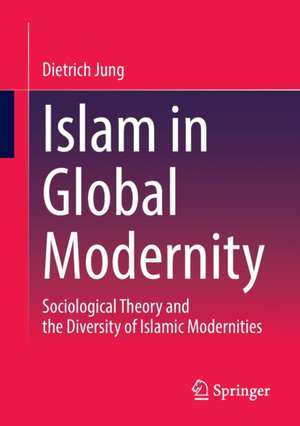Islam in Global Modernity: Sociological Theory and the Diversity of Islamic Modernities
Autor Dietrich Jungen Limba Engleză Paperback – 2 ian 2023
This book combines sociological theorising with studies on the Middle East and Islam. The diversity of modernities that can be observed in our world is linked to the claim of living in a global modernity, in a world society. The book underpins this claim with numerous excursions into Islamic history. It criticises the view that modernisation can be equated with westernisation and considers different projects of specifically Islamic modernities as integral parts of world society. From this perspective, the study contributes to the "provincialisation" of European history in contemporary social scientific thought. Contrary to the theories of postcolonialism associated with the call for the provincialisation of Europe, however, this book adheres to essential traditions of classical sociology. It thus aims to make a contribution to the social theoretical discussion on modernity, which is empirically underpinned with the help of data from the history of the Middle East and Islam.
The translation was done with the help of artificial intelligence. A subsequent human revision was done primarily in terms of content.
The translation was done with the help of artificial intelligence. A subsequent human revision was done primarily in terms of content.
Preț: 523.39 lei
Preț vechi: 615.75 lei
-15% Nou
Puncte Express: 785
Preț estimativ în valută:
100.16€ • 104.19$ • 82.69£
100.16€ • 104.19$ • 82.69£
Carte tipărită la comandă
Livrare economică 14-28 aprilie
Preluare comenzi: 021 569.72.76
Specificații
ISBN-13: 9783658399535
ISBN-10: 3658399538
Pagini: 216
Ilustrații: XI, 216 p. 1 illus.
Dimensiuni: 148 x 210 mm
Greutate: 0.3 kg
Ediția:1st ed. 2023
Editura: Springer Fachmedien Wiesbaden
Colecția Springer
Locul publicării:Wiesbaden, Germany
ISBN-10: 3658399538
Pagini: 216
Ilustrații: XI, 216 p. 1 illus.
Dimensiuni: 148 x 210 mm
Greutate: 0.3 kg
Ediția:1st ed. 2023
Editura: Springer Fachmedien Wiesbaden
Colecția Springer
Locul publicării:Wiesbaden, Germany
Cuprins
Foreword.- By way of introduction: Islam, modernity, modernities and the "provincialisation" of Europe.- Islam and modernity: A sketch of scholarly engagement with the Middle East and Islam.- Islam and the multiplicity of modernity: Multiple, successive and intertwined modernities.- Islam and the unity of modernity: Modernity as "empty progression".- Islam and the emergence of modernity: World society as emergent social reality. Islam and the unity of modernity: modernisation as "empty progression".- Islam and the emergence of modernity: world society as emergent social reality.- Islam and the modern subject: contingency, identity and subject cultures.- Islam and modern "world culture": organisations, institutions and social actors.- In conclusion: World society and the Islamic discourse of modernity.
Notă biografică
Dr Dietrich Jung is Professor in the Department of History and Director of the Center for Modern Middle East and Muslim Studies at the University of Southern Denmark (SDU) in Odense.
Textul de pe ultima copertă
This book combines sociological theorising with studies on the Middle East and Islam. The diversity of modernities that can be observed in our world is linked to the claim of living in a global modernity, in a world society. The book underpins this claim with numerous excursions into Islamic history. It criticises the view that modernisation can be equated with westernisation and considers different projects of specifically Islamic modernities as integral parts of world society. From this perspective, the study contributes to the "provincialisation" of European history in contemporary social scientific thought. Contrary to the theories of postcolonialism associated with the call for the provincialisation of Europe, however, this book adheres to essential traditions of classical sociology. It thus aims to make a contribution to the social theoretical discussion on modernity, which is empirically underpinned with the help of data from the history of the Middle East and Islam.
The author
Dr Dietrich Jung is Professor in the Department of History and Director of the Center for Modern Middle East and Muslim Studies at the University of Southern Denmark (SDU) in Odense.
Caracteristici
Combines innovative sociological theory with Islamic studies Reviews the modernisation theoretical understanding of Islamic history Opposes the hegemony of the identity politics debates of our time
